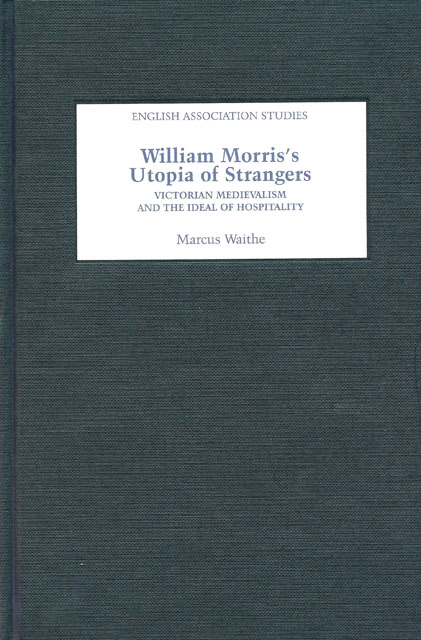Book contents
- Fronmatter
- Contents
- List of illustrations
- Acknowledgements
- Introduction
- 1 Wanderers Entertained: Idealized Hospitality in the Literature of Nineteenth-Century Medievalism
- 2 Before ‘the days when hospitality had to be bought and sold’: Idealized Hospitality and Aesthetic Separatism in Morris’s Work of the 1860s and 1870s
- 3 Entertaining the Past: Problems in Tourism, Translation and Preservation
- 4 Utopian Hospitality: The Teutonic ‘House Community’ and the Hammersmith Guest House
- 5 Legacies
- Conclusion
- Bibliography
- Index
Introduction
Published online by Cambridge University Press: 18 March 2023
- Fronmatter
- Contents
- List of illustrations
- Acknowledgements
- Introduction
- 1 Wanderers Entertained: Idealized Hospitality in the Literature of Nineteenth-Century Medievalism
- 2 Before ‘the days when hospitality had to be bought and sold’: Idealized Hospitality and Aesthetic Separatism in Morris’s Work of the 1860s and 1870s
- 3 Entertaining the Past: Problems in Tourism, Translation and Preservation
- 4 Utopian Hospitality: The Teutonic ‘House Community’ and the Hammersmith Guest House
- 5 Legacies
- Conclusion
- Bibliography
- Index
Summary
The manner in which a household receives its guests – the unexpected as well as the expected – can tell us a great deal. Most obviously, it reveals the extent to which the community in question measures up to certain culturally-prescribed standards. It also demonstrates something more fundamental. Policies governing the reception of outsiders tend to reflect social needs. They indicate, in particular, the degree to which one feels obliged to maintain relations with the outside world. A generous display of hospitality may express many things. Kindness, munificence, indebtedness, and ambition are all associated qualities; but at its most basic level, an emphasis on the reception of strangers implies recognition of, and interest in, an extramural realm.
A rude, ungenerous, reception usually indicates contrary impulses. It might suggest proud independence, a rejection of what is unknown and unnecessary. Yet such behaviour is not merely expressive of contempt for what seems alien. Nor is it sufficient simply to blame malice or bad breeding. Such a response may actually reflect a neutral perception that solutions to internal problems are not to be found in other places. This need not indicate greater devotion to the cause of self-interest. That, after all, could be furthered through commerce with strangers. The question is not, then, one of bad manners, but of an alternative set of manners, manners orientated towards a different social policy.
The same distinction between outward- and inward-looking societies may be applied to the analysis of utopias. Whimsical fictions, political manifestos, and materially realized communities, are all amenable to these categories. In the Western tradition, states that place a premium on isolation and inwardness are often said to be founded upon the Spartan model of social arrest described first by Plutarch, and later adapted by Plato. Equating perfection with stasis, and movement with decadence, such societies seek to police their borders. They are suspicious of strangers. As emissaries of the unknown, strangers disrupt settled social structures. They foment change. The stranger who arrives at the gates of utopia is seen as posing a threat to the harmony achieved therein.
The most prominent attack on this tradition was launched by Karl Popper in the 1940s. His influential book, The Open Society and its Enemies, risks exaggeration in seeking to present Plato, and ‘utopianism’ generally, as straightforward precursors to fascism. But Popper was right in certain respects.
- Type
- Chapter
- Information
- William Morris's Utopia of StrangersVictorian Medievalism and the Ideal of Hospitality, pp. ix - xviPublisher: Boydell & BrewerPrint publication year: 2006



